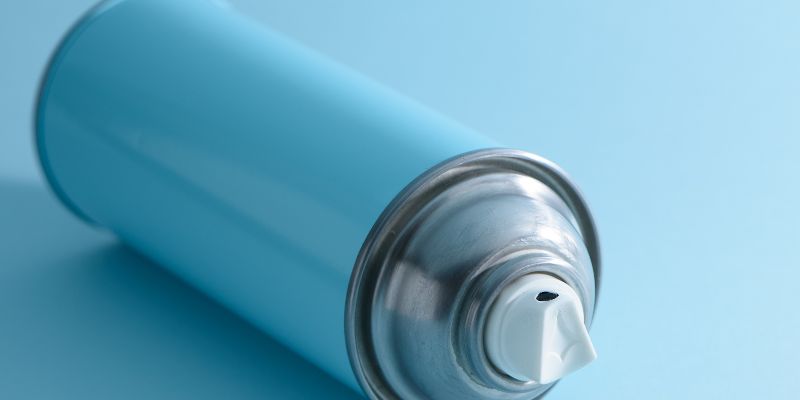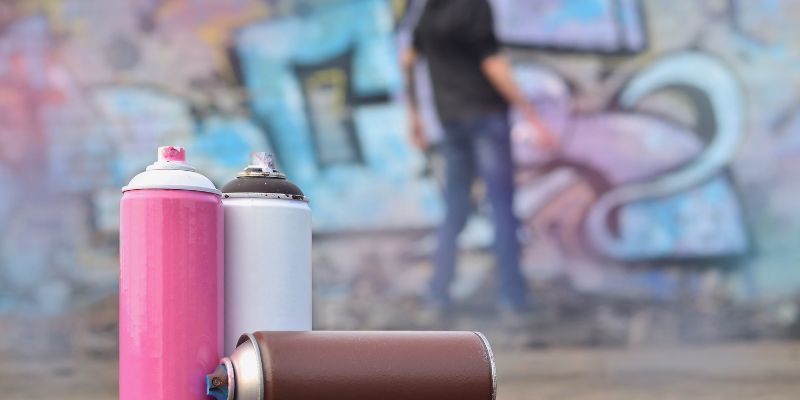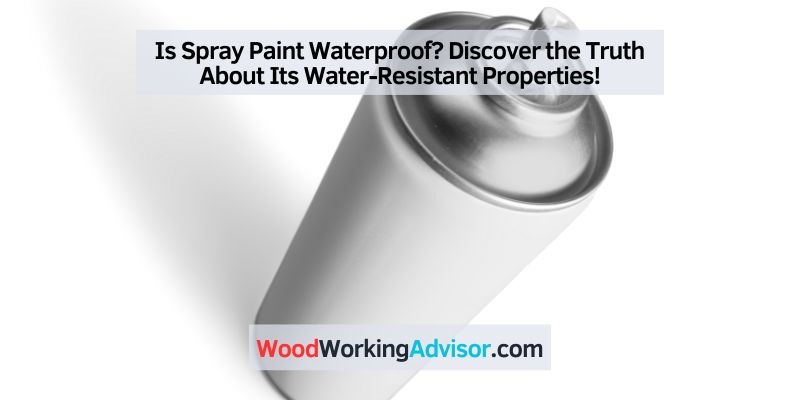Spray paint is not inherently waterproof, but there are waterproof spray paints available on the market. These paints are specially formulated to create a waterproof barrier when applied to surfaces.
Additionally, some spray paints may offer water resistance but not complete waterproofness. It is important to read the product label or contact the manufacturer to determine the specific waterproof properties of a particular spray paint. Keep in mind that even waterproof spray paint can wear off over time or become less effective if not applied correctly or exposed to harsh conditions, so proper preparation and maintenance are crucial for long-lasting waterproof results.
Understanding Spray Paint
Composition Of Spray Paint
Spray paint is a type of paint that is pressurized and comes in a can. It is made up of three main components: solvent, pigment, and resin. The solvent is responsible for keeping the paint in liquid form and evaporates once the paint is sprayed. The pigment provides the color, while the resin acts as a binder, holding the paint together and providing adhesion to the surface.
Different Types Of Spray Paint
There are various types of spray paint available, each formulated for different purposes. Some common types include:
- Acrylic spray paint: This type of spray paint is water-based and dries quickly. It is suitable for both indoor and outdoor use and provides a durable finish.
- Enamel spray paint: Enamel spray paint is oil-based and offers a glossy, hard finish. It is commonly used for automotive projects and outdoor surfaces.
- Multi-surface spray paint: As the name suggests, multi-surface spray paint can be used on a variety of materials such as wood, metal, plastic, and glass. It offers versatility and convenience.

How Spray Paint Works
Spray paint works by using a nozzle to atomize the paint into tiny droplets and propel them onto the surface. When the nozzle is pressed, the pressure in the can forces the paint out, creating a fine mist. This mist settles on the surface and forms a thin, even layer of paint.
The combination of solvent, pigment, and resin in spray paint allows for a smooth application and quick drying time. It also provides excellent coverage and can be built up in layers for more vibrant colors.
Overall, spray paint is a versatile and convenient option for various projects. Whether you are painting furniture, revamping your car, or adding a finishing touch to artwork, spray paint allows you to achieve professional-looking results with ease.
Water Resistance Of Spray Paint
Spray paint has become a popular choice for various DIY projects, allowing us to transform ordinary objects into extraordinary works of art. But as with any paint, it’s essential to consider its water resistance, especially if the finished piece will be exposed to the elements. In this blog post, we’ll explore the water resistance of spray paint, including the factors that affect it, testing methods used to evaluate it, and address common misconceptions surrounding this crucial characteristic.
Factors Affecting Water Resistance
Several factors can influence the water resistance of spray paint. Understanding these factors can help you choose the right type of paint for your specific project:
- The paint formulation: Different spray paints are made using various formulations that incorporate different ingredients. Some formulations may have better water resistance properties compared to others. When choosing spray paint, it’s essential to consider its intended use and check if it offers adequate water resistance.
- Surface preparation: Proper surface preparation is crucial for ensuring good water resistance. If the surface you’re painting is not adequately cleaned or treated, it can affect the adhesion of the paint, compromising its water resistance.
- Application technique: The way you apply the spray paint can also affect its water resistance. Applying multiple thin coats and allowing sufficient drying time between each coat can enhance the durability and water resistance of the paint.
Testing Methods For Water Resistance
Manufacturers use various testing methods to determine the water resistance of spray paint products. These tests aim to simulate real-world conditions and predict how the paint will perform when exposed to water. Some common testing methods include:
- Water immersion test: This test involves submerging painted surfaces or samples in water for a specified period to evaluate the paint’s resistance to water penetration.
- Spray test: In this test, painted samples are subjected to a fine mist of water to assess how well the paint repels water droplets.
- Accelerated weathering: Accelerated weathering chambers simulate extreme weather conditions, including exposure to UV radiation, temperature variations, and water spray. This test helps determine how spray paint withstands outdoor elements over time.
Common Misconceptions About Water Resistance
When it comes to the water resistance of spray paint, several misconceptions exist. Let’s debunk some common ones:
| Misconception | Explanation |
|---|---|
| Spray paint is 100% waterproof. | No spray paint is entirely waterproof. While some may provide excellent water resistance, prolonged exposure to water or harsh conditions can eventually compromise the paint’s protective barrier. |
| All spray paints have the same level of water resistance. | Different spray paints have varying degrees of water resistance based on their formulations and intended uses. Always check the product specifications to ensure it meets your specific requirements. |
| Waterproofing spray paint requires additional steps. | Waterproofing spray paint products are available, but regular spray paints can also offer sufficient water resistance without additional steps. It’s important to choose the right type of paint and apply it properly for the best results. |
Understanding the water resistance of spray paint is crucial for selecting the appropriate product and ensuring the longevity of your painted creations. By considering the factors that affect water resistance, being aware of common misconceptions, and choosing the right testing methods, you can make informed decisions that result in beautifully finished projects that can withstand the test of time.
Applications And Limitations
When it comes to protecting and enhancing surfaces, spray paint is a popular choice due to its convenience and versatility. One of the key considerations when using spray paint is its waterproof or water-resistant properties. Understanding the applications and limitations of water-resistant spray paint can help guide you in choosing the right product for your specific project.
Use Cases For Water-resistant Spray Paint
Water-resistant spray paint finds application in a variety of situations where the painted surface may come into contact with moisture or water. Some common use cases for water-resistant spray paint include:
- Outdoor furniture: Spray painting wood, metal, or plastic furniture can provide a protective layer that can withstand rain, humidity, and other weather elements.
- Automotive parts: Spray painting car parts like grilles, trims, and wheels can help protect them from rust and corrosion caused by exposure to water, road salt, and other environmental factors.
- Marine applications: Water-resistant spray paint is a popular choice for painting boat bottoms, hulls, and other marine surfaces. It helps protect against water damage, including saltwater corrosion and algae growth.
- Bathroom fixtures: When it comes to bathroom fixtures like faucets, showerheads, and towel bars, water-resistant spray paint can provide a durable finish that withstands moisture and prevents peeling or flaking.
- Outdoor equipment: From garden tools to camping gear, spray painting with a water-resistant formula can help extend the lifespan of outdoor equipment by preventing water damage and corrosion.
Limitations Of Water Resistance
While water-resistant spray paint offers an added layer of protection, it’s important to understand its limitations. Here are some aspects to consider:
- Not completely water repellent: Water-resistant spray paint is designed to repel water to a certain extent, but it may not be completely waterproof. Prolonged exposure to water or submersion can eventually compromise the integrity of the painted surface.
- Surface preparation: The effectiveness of water-resistant spray paint depends on proper surface preparation. If the surface is not clean, dry, and properly primed, the paint may not adhere well or provide adequate water resistance.
- Environmental factors: Extreme weather conditions, such as heavy rain, temperature fluctuations, and UV exposure, can affect the longevity of water-resistant spray paint. Regular maintenance and touch-ups may be required to sustain its water-resistant properties.
Tips For Improving Water Resistance
To enhance the water resistance of spray paint and maximize its durability, consider the following tips:
- Choose a high-quality water-resistant spray paint formulated specifically for your intended surface or application.
- Always clean the surface thoroughly and remove any dirt, oil, or rust before applying the spray paint.
- Use a primer designed to enhance adhesion and improve water resistance.
- Apply multiple thin coats of spray paint rather than one thick coat to ensure better coverage and adhesion.
- Consider applying a clear protective topcoat to provide an extra layer of water resistance and UV protection.
- Regularly inspect the painted surface for any signs of wear or damage, and promptly touch up any areas that may have lost their water-resistant properties.
By understanding the applications and limitations of water-resistant spray paint and following these tips, you can make an informed decision and achieve long-lasting and effective water resistance for your next painting project.

Frequently Asked Questions For Is Spray Paint Waterproof
Does Spray Paint Wash Off In Water?
Yes, spray paint can wash off in water.
Is Aerosol Spray Paint Waterproof?
Yes, aerosol spray paint is waterproof. It forms a protective barrier that repels water.
Can Spray Paint Survive Rain?
Spray paint is not designed to withstand rain, so it may not survive heavy rainfall. The paint can wash away or become blurred, resulting in a less durable finish. It is recommended to use spray paint in dry conditions for better results.
How Long Before Spray Paint Is Waterproof?
Spray paint typically becomes waterproof within 24 to 48 hours after application.
Conclusion
To sum up, spray paint can offer some level of waterproofing when properly applied with the right technique. While it may provide a certain degree of protection against water damage, it is important to consider the specific spray paint brand and its intended use.
Remember to follow the manufacturer’s guidelines and take necessary precautions to ensure the durability and longevity of your painted surfaces. Proper surface preparation, multiple coats, and a clear protective finish can contribute to enhancing the spray paint’s ability to resist water.
So, choose the right spray paint for your project and enjoy its potential waterproofing benefits.



One thought on “Is Spray Paint Waterproof? Discover the Truth About Its Water-Resistant Properties!”